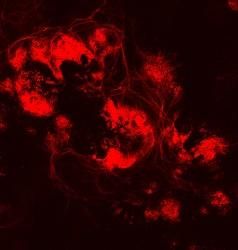JCI publishes Axaron's latest research results about the hematopoietic factor G-CSF
Advertisement
G-CSF counteracts neuronal loss in the brain
Axaron Bioscience AG is pleased to announce that a paper entitled "The hematopoietic factor G-CSF is a neuronal ligand that counteracts programmed cell death and drives neurogenesis" has been published in the current issue of the Journal of Clinical Investigation. The new findings show that G-CSF (Granulocyte-Colony Stimulating Factor), which is commonly used for the stimulation of white blood cells, has previously unrecognized activities in the brain: G-CSF counteracts nerve cell death and stimulates the generation of nerve cells from adult stem cells present in the brain. In pre-clinical models these activities correspond to a marked improvement in long-term behaviour after stroke.
Current stroke treatment relies on the re-opening of clogged arteries by so-called fibrinolytics. However, this treatment is only available to a minority of patients due to time-window constraints and use-limiting side-effects.
The favourable tolerability of G-CSF together with its protective and pro-regenerative activity opens new avenues for the treatment of stroke. In particular, this protein drug would be the first approach towards utilizing the potential of stem cells residing within the brain to contribute to recovery from stroke.
Beyond stroke treatment, the current findings suggest that G-CSF might be of potential therapeutic use in a number of other neurological conditions where neuronal cell death plays a major part. Moreover, one exciting detail of the presented data is that G-CSF enhances hippocampal neurogenesis even in healthy animals, raising questions towards the use in psychiatric diseases, where disturbances in neurogenesis are a potential disease mechanism. The published article represents a joint collaborative effort between Axaron and several academic institutions, in particular the Universities of Heidelberg, Münster, Regensburg and Mainz in Germany as well as the University of Texas in Houston, USA, and the Arvid Carlsson Institute for Neuroscience at the University of Gothenburg, Sweden. The presented data exemplify Axaron's capabilities to discover drugs with neuroprotective and/or neuroregenerative properties for the treatment of neurodegenerative diseases.
Most read news
Topics
Organizations
Other news from the department science

Get the life science industry in your inbox
By submitting this form you agree that LUMITOS AG will send you the newsletter(s) selected above by email. Your data will not be passed on to third parties. Your data will be stored and processed in accordance with our data protection regulations. LUMITOS may contact you by email for the purpose of advertising or market and opinion surveys. You can revoke your consent at any time without giving reasons to LUMITOS AG, Ernst-Augustin-Str. 2, 12489 Berlin, Germany or by e-mail at revoke@lumitos.com with effect for the future. In addition, each email contains a link to unsubscribe from the corresponding newsletter.


























































